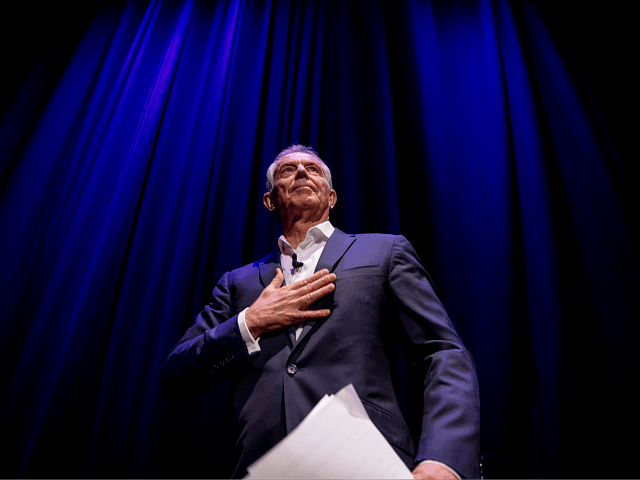Tony Blair has admitted that Brexit was a factor in the election, but suggested that Labour might not have lost had they pushed for a second referendum since 2016.
In September, the former Labour prime minister warned his colleagues against agreeing to Boris Johnson’s calls for a snap election, calling it an “elephant trap” that would result in a “comfortable Tory majority”. In an extraordinary moment of prescience for Mr Blair, he was right: last week the Conservatives won an 80-seat majority and took dozens of Labour seats in the north and Wales.
Addressing an audience in London on Wednesday morning, the former Labour leader, who directed the party away from its working-class roots towards a party of the metropolitan liberal-elites, admitted: “Of course, Brexit was an issue. It was a Brexit General Election – which was why it was a cardinal error for Labour ever to agree it. But an already difficult situation was made impossible by the failure to take a clear position and stick to it.”
He also accepted that the “election settled the debate” on Brexit, and that “Now that Brexit will happen, we must make the best of it and the country must come together.”
However, he claimed that Boris Johnson was able to demolish the Red Wall not because Labour had abandoned Brexit voters, but because Jeremy Corbyn did not provide sufficient anti-Brexit leadership, and that the party should have backed a second referendum from the start.
“What we should have done, following June 2016, is accepted the result, said it was for the Government to negotiate an agreement but reserved our right to critique that agreement and should it fail to be a good deal for the country, advocate the final decision should rest with the people.”
Despite claiming that he takes “very seriously the argument that we ‘deserted’ or ‘disrespected’ our working-class voters by reopening the referendum result”, he said: “Ultimately, we might have lost the most ardent Brexit support, but I believe, with different leadership, we would have kept much of our vote in traditional Labour areas, whilst benefiting from the fact that even in those areas, the majority of those voting Labour, were Remain.”
“Instead we pursued a path of almost comic indecision, alienated both sides of the debate, leaving our voters without guidance or leadership. The absence of leadership on what was obviously the biggest question facing the country, then reinforced all the other doubts about Jeremy Corbyn,” Mr Blair said.
He also diminished the impact Labour Leavers had in crushing the left-wing party by switching allegiances, claiming that between 2017 and 2019, Labour “lost only a small number of voters who were Leave”, with the “biggest percentage fall” being “amongst young people, probably dismayed by the ambiguity over a Brexit they detested”.
This defies findings by the notoriously Europhile Financial Times, which reported on December 13th that the pro-Leave Brexit Party had taken seats from Labour and helped boost the Conservatives’ majority. The newspaper said:
The data also suggest the Brexit party played an important role in the Conservatives’ success. Where the Brexit party contested seats, they took more votes from Labour than the Tories, and Labour suffered greater losses on average where the Brexit party stood than where it did not.
This was most evident in the region of Yorkshire and the Humber where the Brexit party had their best performances. For example, in the Don Valley seat, the Brexit party picked up 15 per cent of the vote as Labour’s share fell by 19 percentage points. Despite the strong showing by the Brexit party, the Conservative vote share ticked up from 42 to 43 per cent, allowing the Tories to unseat Labour’s Caroline Flint.
A report in The Times published on Wednesday reveals internal Conservative estimates that claim that the Brexit Party cost the Tories 20 seats in Labour-held constituencies where Labour Leavers voted for Nigel Farage’s party rather than the Conservatives.
Paul Hilder, chief executive of the polling firm Datapraxis, told the newspaper: “In seats such as Hartlepool, Rotherham and Barnsley Central and East, between 70 and 90 per cent of Brexit Party voters said they would vote Conservative if it was a two-horse race, with a maximum of 6.5 per cent choosing Labour instead” — clearly pointing to Labour Leavers’ decision-making being influenced by a party’s position on Brexit.
Even senior Labour Party member John McDonnell admitted on the morning the election results were called that the Brexit Party stole Labour’s votes.
Mr McDonnell said that he thought the party suffered its worst defeat since 1935 because “Brexit dominated the whole debate. We couldn’t break through on other issues, so I think it was Brexit.
“If you look at what’s happened in most of the seats — particularly in the Northern seats — the votes showed shifts have been from Labour to the Brexit Party rather than the Tories. We just couldn’t get through the Brexit argument, basically.”

COMMENTS
Please let us know if you're having issues with commenting.